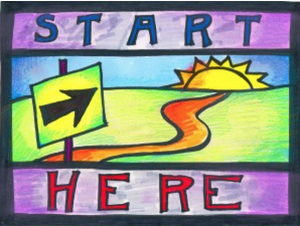We Should Be Better At Negotiating.
 We all know we should become better at negotiating, although maybe you don’t view yourself as the tough, stubborn, hard-nosed type. In fact, if you read about negotiation, you might hear that the most important thing in a negotiation is to know things like your “ZOPA” (Zone Of Potential Agreement) and your “BATNA” (Best Alternative To a Negotiated Agreement.)
We all know we should become better at negotiating, although maybe you don’t view yourself as the tough, stubborn, hard-nosed type. In fact, if you read about negotiation, you might hear that the most important thing in a negotiation is to know things like your “ZOPA” (Zone Of Potential Agreement) and your “BATNA” (Best Alternative To a Negotiated Agreement.)
Or maybe you haven’t heard of those terms and now you’re really wondering how far behind you are.
Yeah… I felt that way too.
We Negotiate Every Day
Negotiation is something that permeates nearly all interactions, every single day. The biggest mistake is thinking that we don’t need to become better at it. I used to avoid reading about it because it sounded too dry and business-y.
Truthfully, most of the 1469 books on Amazon in the “negotiation” section do seem to be both dry and business-y.
After digging through a bunch of them, they all say a lot of similar stuff. They also use esoteric examples like negotiating an oil price raise for Shell or a movie deal for a large Hollywood agency.
Those examples didn’t help me because I wanted to become better at negotiating in my everyday life. Better at negotiating prices of things I buy, better at persuading people around me. I wanted to *FEEL* like I was doing well. I don’t get to negotiate oil prices or even the price of a car every day, so I wanted the small wins to help me get better at negotiating at large. Then, when the next car, house or job offer comes up… I am prepared.
We Need Simple, Everyday Tools
Over the last six years, I’ve gone through many negotiations on the job, either being too aggressive or too nice. But when I was negotiating with investors to fund my previous company, I realized I was getting kicked around and beaten pretty bad in some of our interactions. When I learned about some of the investors’ inner workings on another deal, I realized I had been on the wrong side of some dirty tricks.
I read some of those dry books, and started to find some negotiation methods I could practice within everyday life. Soon, I was getting discounts left and right: free entrance to shows, reservations at fully booked restaurants… it was fantastic.
I also realized how useful it is to develop a “negotiation vocabulary” to pull out in all the hidden negotiations we have every day.
We Make Decisions Emotionally
The other thing I hated about a lot of the books on negotiation is how much they talked about power plays and leverage. I believe this approach distracts from a much more influential component of the negotiation: emotions.
I’ve been lucky to be able to work with Dan Ariely (of Predictably Irrational fame) whose research is all about how we make decisions. Not how we think we make them, but how we really make them.
Ultimately, we make many decisions for emotional reasons, and give logical arguments afterwards.
Many times when people are negotiating a price, it turns into the most basic form of bargaining.
You know this type of situation (maybe you’ve been in one yourself):
I say 60.
You say 50.
We settle at 55, and consider the “negotiation” done.
I used to think the solution was to just set a higher initial number. But there’s more to it than just anchoring high.
There’s More To It Than Bargaining
As I’ve coached more clients and seen more situations, it’s become clear that negotiation is a nuanced form of persuasion.
I’ve since been involved in many, many small and large negotiations, and I now provide private negotiation coaching to start-up founders who are involved in equity or partnership negotiations. I also work with individuals who want to improve their job offers.
In working with companies like Google, I have found having a deep understanding of the emotional component of a negotiation has a far greater influence on the outcome than power and leverage. This is great news, because power and leverage do not always swing in your favor.
From all these negotiations comes the simple truth that we should become better at negotiating. It doesn’t have to be on a big corporate deal or even a job offer. We can practice it in our everyday lives so that when those bigger opportunities come around, we’re confident and ready.


 Craig dos Santos is a silicon valley serial entrepreneur, who has worked at Microsoft, Google, Disney Interactive, as well as started and sold a mobile app company. He now coaches founders and individuals on negotiation, behavioral science and career management.
Craig dos Santos is a silicon valley serial entrepreneur, who has worked at Microsoft, Google, Disney Interactive, as well as started and sold a mobile app company. He now coaches founders and individuals on negotiation, behavioral science and career management.





